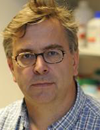Kevin Brindle
Professor, University of CambridgeKevin M. Brindle, D. Phil., is Professor of Biomedical Magnetic Resonance in the Department of Biochemistry at the University of Cambridge and a senior group leader in the Cancer Research UK Cambridge Institute. He became involved in magnetic resonance in 1978 when he started a D. Phil. on 1 H NMR studies of cells with Prof. Iain Campbell FRS at the University of Oxford, where he was also an undergraduate. He joined the laboratory of Prof Sir George Radda FRS at Oxford in 1983 and in 1986 became a Royal Society University Research Fellow. In 1990 he moved to a lectureship at the University of Manchester and in 1993 to a lectureship in Cambridge, where he became Professor in 2005. His initial work involved studies of the kinetic properties of enzymes in cells and tissues using molecular genetic, isotope exchange and magnetization transfer methods. This also involved the development of methods to study proteins in intact cells. In 1990 he started work in the field of cancer, initially using DCE MRI to study the action of anti-vascular drugs and subsequently he developed methods to detect tumour cell death post-treatment, which included a targeted MRI contrast agent. Since 2006 he has been working on metabolic imaging with hyperpolarized 13C-labelled cell substrates to detect treatmen t response in tumours. He is currently associated with the editorial boards of NMR in Biomedicine, Contrast Media and Molecular Imaging and Cancer and Metabolism. He was elected a Fellow of the Academy of Medical Sciences in 2012. |  | | | John Draper
Professor, Aberystwyth UniversityProfessor Draper currently manages the High Resolution Metabolomics Laboratory and is responsible for oversight of Enabling Technologies within IBERS including core facilities for Metabolomics, Next Generation Sequencing, Plant Phenomics and Bioinformatics. |  | | | Mike Murphy
Group Leader, Medical Research CouncilMike Murphy received his BA in chemistry at Trinity College, Dublin in 1984 and his PhD in Biochemistry at Cambridge University in 1987. After stints in the USA, Zimbabwe, and Ireland he took up a faculty position in the Biochemistry Department at the University of Otago, Dunedin, New Zealand in 1992. In 2001 he moved to the MRC Mitochondrial Biology Unit in Cambridge, UK (then called the MRC Dunn Human Nutrition Unit) where he is a group leader. His research is concerned with all aspects of mitochondrial function and dysfunction. Currently his special interests are in targeting small molecules such as antioxidants to mitochondria, and in understanding how modifications to the thiol status of mitochondrial proteins contributes to oxidative damage and redox signalling. |  | | | Uwe Sauer
Professor, Swiss Federal Institute of Technology Zurich (ETH)With a Ph.D. in Microbiology (1992, Univ. Göttingen), Uwe Sauer is Professor of Systems Biology at the ETH Zurich. His research focuses on quantitative understanding of the complex regulation processes that control cellular metabolism. His lab has pioneered development of high-throughput metabolomics and flux analysis methods. |  | | | Etienne Thevenot
Research Scientist, CEAAfter an education in mathematics and physics at the MINES ParisTech graduate school, Etienne Thévenot obtained his PhD in molecular and cellular neurobiology. He has been working at CEA for more than 10 years as a biostatistician and bioinformatician. His research in computational metabolomics focuses on signal processing, analysis, modeling and integration of metabolomics data for biomarker discovery. He is coordinator of the bioinformatics workpackage of the French infrastructure for metabolomics and fluxomics (MetaboHUB). |  | | | Michael Wakelam
Professor, Babraham InstituteProfessor Michael Wakelam is the Director of the Babraham Institute, an independent charitable life sciences institute, sponsored by the Biotechnology and Biological Sciences Research Council. It undertakes world-leading innovative research and advanced training with relevance to the biomedical, biotechnological, pharmaceutical and healthcare communities. The commercialisation of the Institute's research is managed by its wholly-owned trading subsidiary, Babraham Bioscience Technologies Ltd.
Professor Wakelam trained initially in medical biochemistry and biochemistry at the University of Birmingham. He has over twenty years research experience in the area of cell signalling; focusing particularly in recent years on the regulation of signalling pathways in normal and cancer cells and in inflammatory responses, and on interactions between different molecules in the pathways. The principal aim of his current research is to understand how and where in cells, signalling phosphatidic acid is produced, and to identify the molecular targets and the cellular processes regulated by phosphatidic acid. |  | | |
|

 Add to Calendar ▼2015-12-07 00:00:002015-12-09 00:00:00Europe/LondonMetaboMeeting 2015MetaboMeeting 2015 in Cambridge, UKCambridge, UKSELECTBIOenquiries@selectbiosciences.com
Add to Calendar ▼2015-12-07 00:00:002015-12-09 00:00:00Europe/LondonMetaboMeeting 2015MetaboMeeting 2015 in Cambridge, UKCambridge, UKSELECTBIOenquiries@selectbiosciences.com